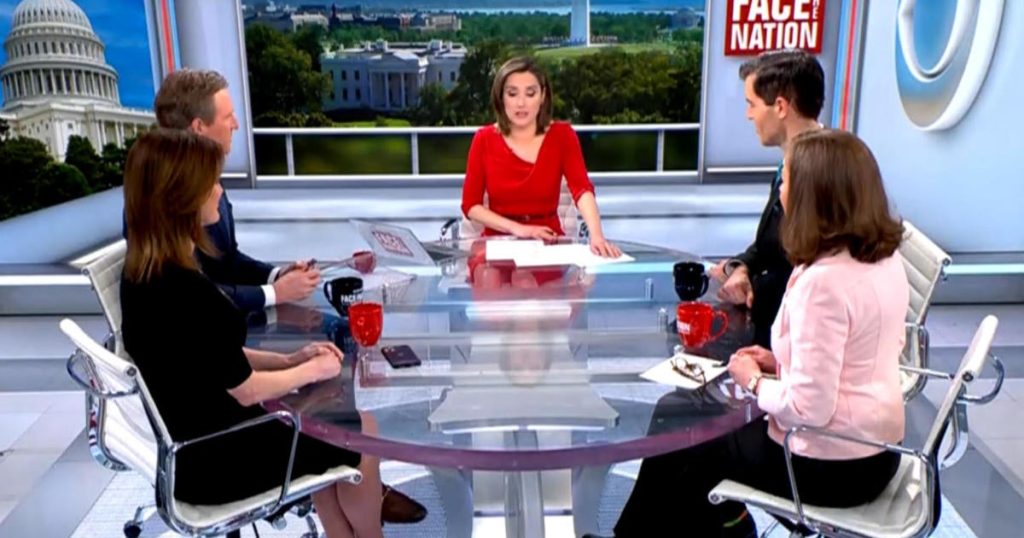Understanding the Trump Administration’s Bureaucratic Overhaul: Insights from CBS News Experts
The Trump administration’s bureaucratic overhaul has been a subject of significant discussion and debate among political analysts, legal experts, and cybersecurity specialists. Recently, CBS News brought together a panel of distinguished correspondents and contributors to shed light on the implications of these changes. Scott MacFarlane, Jan Crawford, Sam Vinograd, and Chris Krebs joined Margaret Brennan on "Face the Nation" to discuss the impact of the Trump administration’s policies on various aspects of government and national security.
The Impact on the Justice Department
Scott MacFarlane, CBS News Justice Department correspondent, provided insights into how the Trump administration’s policies have influenced the Justice Department. He highlighted the significant shifts in priorities, particularly in areas such as immigration enforcement and the handling of high-profile investigations. MacFarlane noted that the administration’s approach has led to a restructuring of the department’s focus, with an emphasis on stricter immigration policies and a more assertive stance on certain legal matters. This shift has not been without controversy, as it has drawn criticism from those who argue that it undermines the independence of the judiciary and the balance of power within the government.
Legal Implications and the Role of the Judiciary
Jan Crawford, chief legal correspondent for CBS News, delved into the legal implications of the Trump administration’s overhaul. She discussed the administration’s efforts to reshape the judiciary, particularly through the appointment of conservative judges to federal courts. Crawford emphasized that these appointments could have long-term effects on the interpretation of laws and the balance of the judiciary. She also touched on the potential challenges these changes could pose to the Supreme Court, as the composition of the court continues to evolve. Crawford’s analysis underscored the critical role of the judiciary in maintaining checks and balances within the government, and how the administration’s policies could impact this delicate balance in the future.
Homeland Security and National Security Implications
Sam Vinograd, a homeland security contributor for CBS News, discussed the implications of the Trump administration’s policies on homeland security. Vinograd highlighted the administration’s focus on border security and immigration enforcement, which has been a cornerstone of its platform. She explained how policies such as the travel ban and the increased militarization of the southern border have reshaped the country’s approach to national security. Vinograd also addressed the potential risks associated with these policies, including the impact on international relations and the potential for increased tensions with other nations. Her insights provided a comprehensive view of how the administration’s decisions have influenced homeland security strategies and the broader national security landscape.
Cybersecurity Challenges and the Administration’s Response
Chris Krebs, a cybersecurity expert and analyst for CBS News, discussed the challenges posed by cybersecurity threats during the Trump administration. He noted that the administration has faced significant challenges in protecting the nation’s cyber infrastructure, particularly in the face of increasingly sophisticated attacks from foreign adversaries. Krebs highlighted the administration’s efforts to improve cybersecurity defenses, including the establishment of the Cybersecurity and Infrastructure Security Agency (CISA). He also discussed the importance of international cooperation in addressing these threats, emphasizing that cybersecurity is a global issue that requires a collective response. Krebs’ analysis provided valuable insights into the administration’s approach to cybersecurity and the ongoing challenges in this critical area.
Balancing National Security and Civil Liberties
One of the overarching themes discussed by the panel was the balance between national security and civil liberties. The Trump administration’s policies have often been criticized for prioritizing national security over individual freedoms, particularly in areas such as immigration and surveillance. The panelists explored how these policies have affected various communities, including immigrants, minorities, and political dissidents. They also discussed the potential long-term consequences of these policies on the fundamental rights of citizens and the overall health of democratic institutions. The discussion highlighted the tension between ensuring national security and protecting civil liberties, and the challenges of finding a balance that respects both.
The Future of Governance and National Security
As the discussion concluded, the panelists reflected on the future of governance and national security under the Trump administration’s overhaul. They considered the potential legacy of the administration’s policies and how they might shape the direction of the country in the years to come. The panelists also addressed the importance of transparency and accountability in government, emphasizing that these principles are essential for maintaining public trust and ensuring effective governance. Their insights provided a thought-provoking perspective on the implications of the Trump administration’s policies and the challenges that lie ahead for the nation.
In summary, the Trump administration’s bureaucratic overhaul has had far-reaching implications for various aspects of government and national security. The discussions by CBS News correspondents and contributors provided a comprehensive analysis of the impact of these changes, highlighting both the challenges and the potential consequences for the future. As the administration’s policies continue to evolve, it remains critical to consider their effects on the balance of power, civil liberties, and the overall security of the nation.












